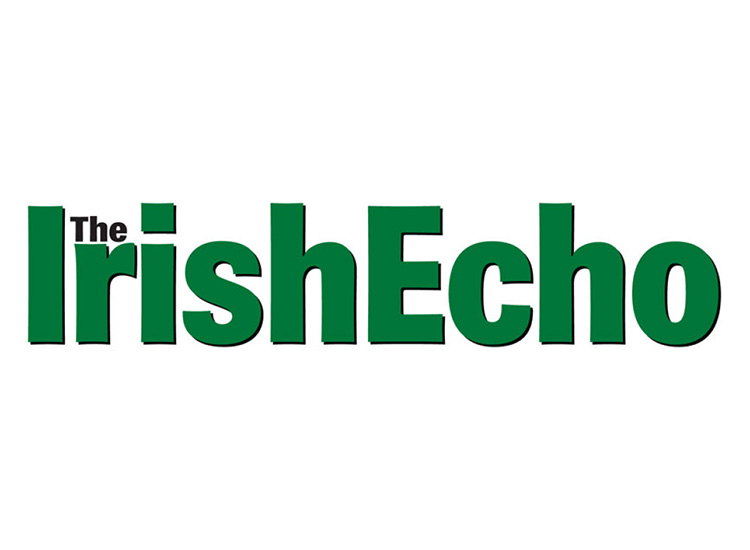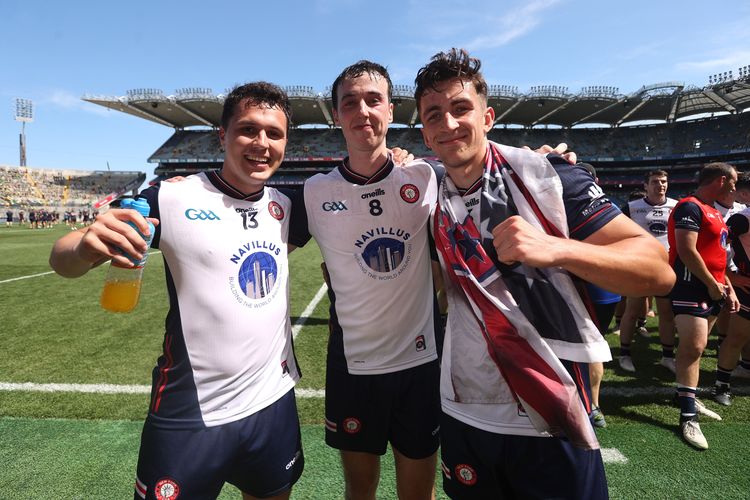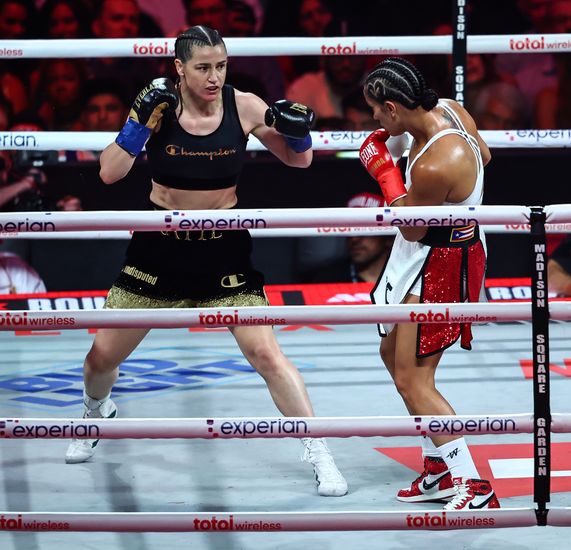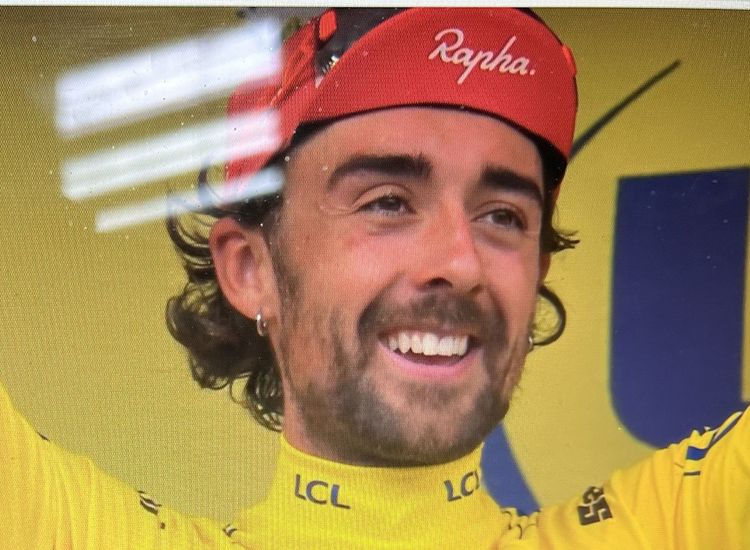Simon Coveney speaking before an inspirational backdrop Wednesday evening. Photo by Marty Katz.
By Irish Echo Staff
Tánaiste and Minister for Foreign Affairs and Trade Simon Coveney saluted the Friends of Ireland in Congress Wednesday evening at a reception on Capitol Hill.
Speaking at a podium in front of a portrait of George Washington, just days before the first president’s birthday, Coveney spoke of Ireland, of the First Dáil a century ago, of America and the ties that bind the two countries.
He did so with the reality and uncertainty of Brexit looming ever larger across the Atlantic from the nation’s capital.
Here below is the text of Coveney’s address.
“Internationally, Ireland is the gateway of the Atlantic. Ireland is the last outpost of Europe towards the West: Ireland is the point upon which great trade routes between East and West converge: her independence is demanded by the Freedom of the Seas: her great harbours must be open to all nations.”
Those words were first uttered in Dublin’s Mansion House one hundred years ago, on the inaugural meeting of Dáil Éireann, the first truly democratic parliament of the Irish people.
The lines are drawn from the “Message to the Free Nations of the World,’ one of three foundational texts adopted at that meeting. Evidence that from its very inception, our Nation has had a global outlook.
But while addressed to all free nations, the message of that first Dáil was most clearly focused on the United States - then, as now, our closest external connection, home to a unique diaspora descended from the six million Irish who journeyed here between 1840 and 1900.
The appeal for international recognition of Irish independence was aimed, in particular, at the very many influential Irish-Americans of that time, above all those sitting in the 65th Congress.
And it found a receptive audience.
As early as April 1917, Congressmen Gallagher of Illinois and Carey of Wisconsin had called on the United States to make Irish independence a pre-condition for any settlement of the war.
Then House speaker, Champ Clark of Missouri, and 136 members telegraphed the British Prime Minister, David Lloyd George, reiterating that the rights of small nations applied equally to Ireland and stressing the importance the American people attached to the cause of Irish freedom.
By March 1919, a resolution proposed by Congressman Gallagher called on President Woodrow Wilson, whose grandfather had immigrated from Tyrone, to make Irish self-determination a part of the negotiations at Versailles.
In the course of debate, Gallagher quoted an excerpt of the 1916 proclamation declaring its principles to be the same as those “immortalized” by America’s founders.
His resolution passed overwhelmingly by 216 to 45.
Gathering tonight in this citadel of democracy, we celebrate both the centenary of the first Dáil, and the generations of Irish-American congressional leaders who have without fail supported the democracy born in the Mansion House that day.
On behalf of the Government and people of Ireland, I want to say a most heartfelt thank you to all members of the ‘‘Congressional Friends of Ireland’’ Caucus – for all you have done and all you continue to do for the relationship between our two peoples.
And I wish to pay special tribute to the outstanding leadership of Richie Neal and Peter King.
Richie, as you all know, has, with the new Congress, assumed a singularly important and distinct chairmanship.
Previously Co-Chair with Peter, he is now formally Chair of the Friends of Ireland!
I gather, Richie, that that is not your only duty in this House. That in your spare time, Speaker Pelosi has also asked you to reflect on the ‘‘Ways and Means’’ of managing this nation’s finances.
In seriousness, I know this new appointment is as challenging as it is prestigious. But there is none on the Hill more qualified, and I wish you all the best as you assume these hugely important duties.
And I am also very much looking forward to welcoming you and a number of your colleagues to Ireland later this year.
Friends, this Congress has many Caucuses. But few have achieved as much or left so great an imprint as the one which Richie and Peter lead.
Formed on St. Patrick’s Day in 1981, the Caucus stressed from its very beginning that it would be bipartisan, both here on the Hill and in relation to Northern Ireland. And I’m delighted to say that at least two of its founding members – Senators Pat Leahy and Ed Markey - are still serving here. And, happily, still great Friends of Ireland.
As a fellow politician, I can only admire their staying power.
Those ‘‘founding Friends’’ included George Mitchell, who we remember and revere in Ireland for his later pivotal contribution in chairing the talks that led to the Good Friday Agreement.
And also, of course, the ‘‘four horsemen’’ - Pat Moynihan, Ted Kennedy, Tip O’Neill and Hugh Carey – whose renown across the island of Ireland is matched only by their status here in the Capitol.
It’s a special honour, then, to be joined tonight by members of the family of Speaker O’Neill and Senator Kennedy.
Looking back, it is fair to say that the first Dáil Éireann and the 65th U.S. Congress shared many connections.
But one warrants special mention.
Both contained a solitary woman, in both cases a first.
On either side of the Atlantic, Jeannette Rankin of Montana and Constance Gore-Booth Markievicz of Dublin were trailblazers in representative democracy.
Markievicz was the first woman elected to the British House of Commons, a seat she refused to take, sitting instead in that first Dáil. She would soon be appointed to cabinet, amongst the first women in the world to serve in a ministerial post.
Rankin became the first woman elected to Congress, and one of the very few suffragists ever elected. The achievements of Rankin and Markievicz are powerful reminders of both the richness of our histories and of how far we still have to go to fulfil the vision of genuine equality in terms of parliamentary representation and political power.
Friends, this evening, as we celebrate the distinguished history and continued strength and depth of the U.S.-Ireland relationship, we also look ahead.
My Government colleagues and I are determined to protect, invest in and develop Ireland’s relationship with the U.S. for the future. We want it to thrive for the benefit of all of our citizens.
I’m delighted, therefore, to launch Ireland’s new strategy for our relationship with the United States.
An ambitious strategy which takes as its inspiration and starting point the first Dáil’s message: that Ireland is the gateway of the Atlantic and “open to all nations.”
The Taoiseach and I are wholly committed to the vision of the Strategy: that, under our Global Ireland programme, we will inject new dynamism and energy into our relationship with the U.S.
And in so doing, double our impact here in the period to 2025.
What’s envisaged is nothing less than a step-change in our engagement - an engagement commensurate with the importance of the relationship, taking account of new geopolitical realities and demographic change.
An unprecedented level of investment in our presence and capacity across the U.S. will enable us to build new partnerships, at every level, and in every state. Just as Ireland has expanded into the American South in recent years with new Consulates in Atlanta and Austin, so we will extend our reach with the opening of a new office in Los Angeles this summer and an Ireland House presence in Miami before the end of this Strategy.
We will devote new energy to our thriving reciprocal economic relationship, currently responsible for the direct employment of over a quarter of a million of our citizens.
The combined value of Ireland’s trade in good, trade in services, tourism and investment with the U.S. and Canada was over $670 billion in 2017. With new EU trading arrangements, we want that relationship to be approaching $1 trillion by 2025.
We will deepen our political relationships too for our mutual benefit, and to address common challenges.
From Ireland’s vantage point, the EU-U.S. partnership is one of shared interests and values; vital for our shared peace and prosperity. Now, more than ever, it is essential to addressing global challenges.
Our Strategy will see Ireland take the initiative to support deeper and wider transatlantic ties, in particular as our neighbour - the UK - prepares to leave the EU.
We never wanted the UK to leave the EU. The EU and Ireland will be weaker for the UK’s departure, just as many expect the UK will struggle to replicate its current influence or growth outside the Union. But we respect the democratic decision the UK electorate made in June 2016, however narrowly it was reached.
It is, at the same time, a decision that poses very significant challenges for us.
Our aim is minimise the considerable downsides of Brexit and to maximise any upsides. Two of those upsides will be our capacity - as the largest English-speaking country in the EU after Brexit - to become more of a bridge between the EU and the U.S., and an even more attractive location for U.S. companies seeking a base within the EU single market.
Beyond Brexit, for Ireland in the U.S., we must connect with new generations, across communities of Irish heritage and none, to ensure the age-old transatlantic relationship develops and evolves for the future.
We must provide more opportunities for our talented young people to work in each other’s countries – we came close in the last Congress, with proposals to expand the E3 scheme – we should both deliver on providing those opportunities now.
This effort should include extending educational links, deepening cultural connections and sharing our sporting experiences more widely. The growth of Gaelic football and hurling clubs across this great country is an inspiring story with many more chapters left to write.
The partnership between our parliaments – between Dáil and Congress - is a key element of our strategy too.
With this in mind, I’d like to take the opportunity to recognise my colleagues from the Irish–U.S. Parliamentary Group, who are here as part of the centenary celebrations: the Speaker of our Senate, Denis O’Donovan; two very distinguished former predecessors of mine as deputy Prime Minister, Frances Fitzgerald and Joan Burton; and also Deputy Aengus Ó Snodaigh, and Senator Mark Daly.
The delegation represents four parliamentary parties. Parties which – like your own – differ on many issues. But which, like the Friends, are united in their commitment to transatlantic relations and to protecting peace on the island of Ireland.
In that context, I greatly appreciate the strong support from this Congress to see the restoration of the power sharing institutions in Northern Ireland and the full implementation of the Good Friday Agreement.
Staunch and steadfast friends here tonight have been among our most formidable allies as we face the deep challenges posed by Brexit and the overriding need to avoid a return to a hard border on the island of Ireland.
And throughout these long and complicated negotiations, the solidarity of the European Union, of which we remain a strong and committed member, has been clear to all.
Reflecting that, I would like to recognise the EU Ambassador, and a very distinguished Irishman, David O’Sullivan, who retires shortly from an extraordinary career in Brussels and latterly here in Washington, D.C. David, I wish you and Agnes all the very best as you embark on a new phase of life.
Finally, as a symbol of our appreciation and thanks for all they, and all you do, to further this deep and historic friendship, it’s my great pleasure to present Chairman Neal and Congressman King with special gold coins – euros to be exact - commissioned to mark the centenary of the first Dáil Éireann.
Who said membership of the “Friends of Ireland” doesn’t pay?
The first Dáil conducted its business predominantly through Irish. Let me end then, by saying “go raibh míle maith agaibh,” a thousand thanks, for all you do to keep the relationship between Ireland and the United States as strong and vibrant as it is today.
Let us resolve to build on, and be ever more ambitious for, this unique friendship, this vital relationship, as together we embark on the next century of relations between Ireland and these United States.









